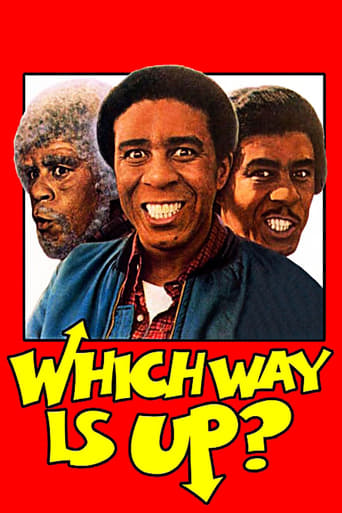Three times the Richard Pryor. Three times the laughs.
"Which Way Is Up?" is a 1977 American comedy film directed by Michael Schultz and produced by Universal Pictures. The film stars Richard Pryor in a triple role, showcasing his versatile comedic talents. Set in the backdrop of California's agricultural fields, the story follows Rufus Jones, a simple farm worker who becomes entangled in a series of humorous and chaotic situations involving labor unions, family dynamics, and mistaken identities. Pryor's portrayal of Rufus, along with his impersonations of an orange plantation owner and a flamboyant preacher, adds layers of satire and social commentary to the film's uproarious narrative. The film cleverly uses its comedic premise to explore themes of social inequality and the struggles of the working class. Rufus's journey from a humble farm worker to a union organizer highlights the challenges faced by laborers in their fight for better wages and working conditions. The humor is often derived from the absurdity of the situations Rufus finds himself in, yet it never loses sight of the underlying message about the importance of solidarity and perseverance. Pryor's energetic performance and sharp wit keep the audience engaged, making "Which Way Is Up?" both entertaining and thought-provoking. In addition to its social commentary, "Which Way Is Up?" is notable for its bold and unapologetic approach to humor. The film does not shy away from tackling controversial topics such as infidelity and racial dynamics, using comedy as a tool to address these issues head-on. The interactions between Rufus and his family, particularly his relationships with his wife and mistress, provide some of the film's most memorable and laugh-out-loud moments. The ensemble cast, including Lonette McKee and Margaret Avery, delivers strong performances that complement Pryor's comedic genius. Overall, "Which Way Is Up?" stands out as a unique blend of slapstick comedy and social satire. Its release in 1977 by Universal Pictures marked a significant moment in American cinema, showcasing Richard Pryor's ability to entertain while shedding light on important societal issues. The film's enduring appeal lies in its ability to make audiences laugh while prompting them to reflect on the complexities of life and the pursuit of justice and equality.
Año1977
Presupuesto3200000$
Duración94 minuto
GénerosComedia
Países de producciónUnited States of America

